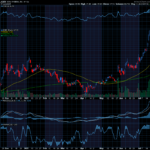by Andy Chambers
Proper record keeping is another one of those basic, fundamental activities that should become second nature to you. There are three sets of records you should always keep up to date.
- Individual Trade Tickets
- Trading Log
- Open Order Log
Individual Trade Tickets
A trade ticket is a paper record of every order placed and it should be completed by hand before any order is entered. Computers can crash, brokerage firms can make mistakes, and traders often enter orders incorrectly. By writing a legible order ticket for each trade you can help eliminate, or at least reduce sharply, the incidence of trader order entry error. You will also have a complete record for each and every market action you take.

At the top of the trade ticket enter the name of the brokerage firm receiving the order, your account number, and the order date. Complete these three sections even if you have only one trading account now. You may have another account in the future and a completed ticket will help you to identify exactly where and when you placed an order. It is also a good idea to number your tickets sequentially.
The middle section with BUY on the left and SELL on the right can be used to record orders for securities other than options. The bottom section of the order ticket is for option orders. Write the entire order in the proper section and then mark each word with a pencil as you enter the order. If your order is to BUY 2 OCT 560 OEX CALLS at MARKET, then do the following: When you say or use the keyboard to select BUY, use a pencil to check through the word BUY on the order ticket. Use the pencil to place a check mark though each word of the order written on the ticket as you say it to the phone clerk or key it in on the computer keyboard. This method may seem tedious but it helps to eliminate many of the errors that occur on the order entry.
Once the order is entered you will receive a confirmation number from your brokerage firm that should be recorded at the top of the ticket in the section “Floor Order Number.” Later, when the fill is reported, record the price and date of the fill in the paper sections at the top of the ticket. If the order does not fill, or if it is canceled, draw a diagonal line across the entire ticket to indicate that no action occurred. When canceling an order be sure to record the cancel date.
Trading Log
The trading log is a compilation of information taken from individual trade tickets. Why bother with the log is you have trade tickets? It is much easier to review a daily, weekly or monthly trading log then to sort through a bunch of trade tickets that may or may not be in sequence. You may remember trades made yesterday, last week or even two months ago, but what if you had to find information on a trade made two years ago? A trading log addresses that problem. Be sure to attach the individual trade tickets to the proper trading log for a complete record.
Open Order Log
You have a long stock index position and an Open Sell Stop Order to protect the position in case the market turns lower. You log on to your computer and see that the stock index spiked 15 points higher at the opening and you decide to get out now. You are very excited; this was a great trade; you cannot wait to tell your spouse; must find the nearest Lexus dealer. You sell your position and book the profit. That afternoon the market turns sharply lower, finds support, then rallies back to the highs. Big problem: You forgot to cancel your Open Sell Stop and are now short the market. Say goodbye to the Lexus.
OPEN ORDERS DO NOT GO AWAY AUTOMATICALLY! YOU MUST ALWAYS CANCEL AND OPEN ORDER! These things do happen because traders forget to deal with their open orders. The Open Order Log will help to eliminate this problem. By simply scanning the sheet each day you know immediately which orders are still working and which ones should have been canceled or filled. And if the brokerage firm reports a fill on an order canceled previously, you have immediate access to very necessary information.
How much time should you spend on record keeping chores? As much time as needed to keep accurate, helpful, necessary records. Trading is a business for many people. Is it a business for you? Be careful! Keep records!










Recent Comments